#mathias wieman
Explore tagged Tumblr posts
Text

Mathias Wieman, June 23, 1902 – December 3, 1969.
With Ingrid Bergman in Roberto Rossellini’s Fear (1954).
10 notes
·
View notes
Text
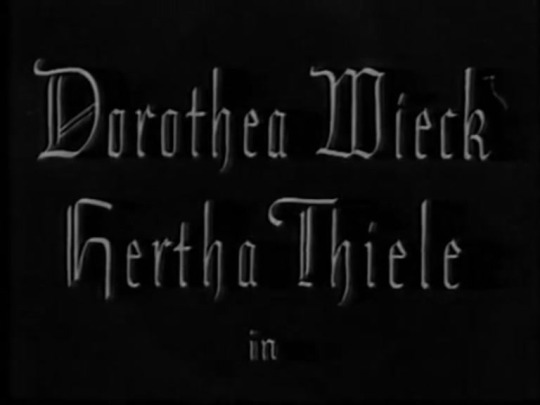





Anna und Elisabeth, Frank Wisbar 1933
#Anna und Elisabeth#Frank Wisbar#1933#dorothea wieck#hertha thiele#mathias wieman#carl balhaus#roma bahn#sybill smolowa
9 notes
·
View notes
Text

Mathias Wieman on a vintage postcard
#postkaart#mathias wieman#mathias#carte postale#wieman#postcard#historic#postkarte#postal#tarjeta#sepia#photo#ansichtskarte#briefkaart#old#vintage#photography#ephemera
4 notes
·
View notes
Text


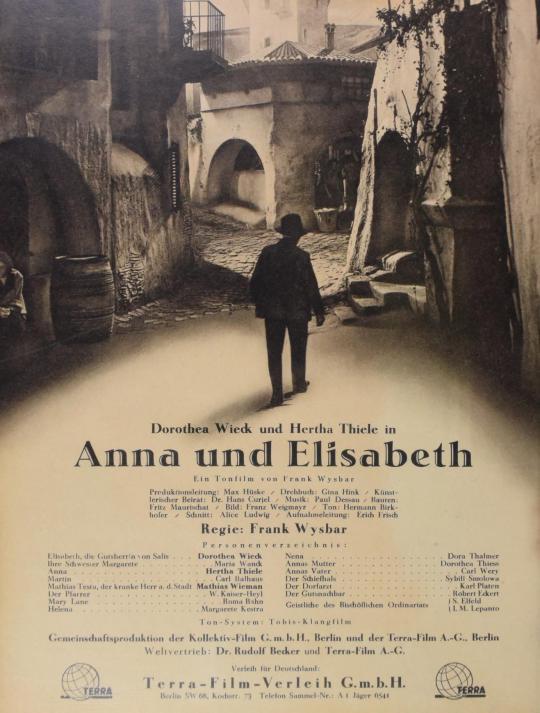


Anna and Elizabeth (Anna und Elisabeth) (1933) Frank Wisbar
September 5th 2023
#anna and elizabeth#anna und elisabeth#1933#frank wisbar#dorothea wieck#hertha thiele#mathias wieman#maria wanck#carl balhaus#willy kaiser-heyl
3 notes
·
View notes
Text
June 23 ZODIAC
They are grasping individuals with a serene disposition, happy with themselves and with their life. They are very high. They have a great gift for explaining covered up and indistinct issues. Unobtrusive, sexy, they appreciate showing up in broad daylight and hypnotizing swarms. Their disposition is touchy and adoring, and they readily penance themselves for others. Thusly, they are normally blissful in adoration, and their marriage is additionally very amicable. Their calling expects them to go far. They feel thoughtful connections to society and are joined to their country, as well regarding their nearest loved ones. They frequently live in one spot for quite a while, particularly getting a charge out of strolls on the water. They can handily orchestrate their lives and do a large number of things. They figure out how to disregard the success span time. It might happen that the initial segment of your life is less lucky; Youngsters particularly can be loaded up with agonizing encounters. Nonetheless, their professions are consistently balancing out and they feel like they are improving. Its blemishes are vanity and triviality. Individuals like this are a piece shallow with their appearance. Zodiac sign for those brought into the world on June 23 Assuming your birthday is June 23, your zodiac sign is Disease June 23 ZODIAC
character: great, careful, devoted, intolerant, urgent, antagonistic calling: PC researcher, student of history, vocalist tones: red, cream, dark stone: diopside creature: ocean lion plant: sage fortunate numbers: 12,14,20,29,39,53 very fortunate number: 27 Occasions and observances - June 23 Nicaragua: Father's Day. Worldwide Dravet Condition Day. Olympic day Spain: Evening of San Juan. Joined Countries: Joined Countries Day for Policy management. Luxembourg: Public day. Mapuche New Year. Joined Countries: Global Widows Day. June 23 Superstar birthday celebrations. Who was conceived that very day as you? 1902: Alfred Charles Kinsey, American researcher (d. 1956). 1902: Mathias Wieman, German entertainer (d. 1969). 1907: James Meade, English business analyst, 1977 Nobel Prize in financial matters (d. 1995). 1910: Jean Anouilh, French writer (d. 1987). 1910: Gordon B. Hinckley, Mormon prophet (d. 2008). 1910: Milt Hinton, American jazz artist (d. 2000). 1912: Alan Turing, English mathematician, scholar, PC researcher, cryptographer, and thinker (d. 1954). 1922: Juan San Martდn, Spanish essayist (f. 2005). 1927: Weave Fosse, American entertainer, choreographer and producer (d. 1987). 1927: Jacobo Langsner, Argentine essayist and screenwriter. 1928: Pდ¡l Jakucs, Hungarian scholar (d. 2000). 1929: June Carter Money, American artist (d. 2003). 1930: John Huxtable Elliott, English antiquarian. 1935: Thomas Brandis, German musician. 1936: Carlos Fonseca, Nicaraguan teacher, lawmaker and progressive (f. 1976). 1936: Raდºl Aubel, Argentine entertainer (f. 1997). 1936: Richard Bach, American essayist. 1936: Costas Simitis, Greek lawmaker, state leader somewhere in the range of 1996 and 2004. 1937: Martti Ahtisaari, Finnish government official, president somewhere in the range of 1994 and 2000. 1937: Josდ© დ?ngel Garcდa de Cortდ¡zar, Spanish student of history. 1939: დ?lvaro Pombo, Spanish essayist. 1940: Wilma Rudolph, American competitor (d. 1994). 1940: Stuart Sutcliffe, English bassist, known as the fifth Beatle (d. 1962). 1941: Richard M. Roberts, American writer. 1943: Vinton Cerf, American software engineer, trailblazer of the Web. 1943: James Levine, American guide. 1943: Albert Pintat, Andorran president. 1945: John Garang, Sudanese pioneer (d. 2005). 1946: Jaime Guzmდ¡n, Chilean attorney and legislator, teammate of Augusto Pinochet (f. 1991). 1947: Bryan Brown, Australian entertainer. 1948: Clarence Thomas, American law specialist. 1948: Myles Goodwyn, Canadian guitarist, of the band April Wine. 1948: Luther Kent, American blues vocalist. 1951: Michele Mouton, French pilot. 1952: Fernando Luna Vicente, Spanish performer. 1952: Carlos Faraco, Spanish speaker and author. 1953: Russell Mulcahy, Australian movie chief. 1954: Carmen Pinდ³s, Spanish designer. 1955: Glenn Danzig, American performer, of the band The Mavericks. 1955: Jean Tigana, French footballer. 1956: Randy Jackson, American maker. 1957: Frances McDormand, American entertainer. 1961: David Leavitt, American author. 1961: LaSalle Thompson, American b-ball player. 1962: Throw Billy, American vocalist, of the band Confirmation. 1962: Steve Shelley, American drummer, of the groups The Crucifucks and Sonic Youth. 1963: Colin Montgomerie, Scottish golf player. 1963: Astrid Carolina Herrera, Venezuelan entertainer, model and telecaster, who was Miss World 1984. 1964: Joss Whedon, American author, chief and leader maker. 1965: Fernanda Tapia, Mexican moderator. 1965: Paul Arthurs, guitarist of the English gathering Desert garden. 1966: Chico DeBarge, vocalist of American R&B (DeBarge). 1969: Alberto Chicote, Spanish cook 1969: Martin Klebba, American entertainer. 1970: Yann Tiersen, French performer and author. 1970: Christian Meier, Peruvian entertainer, model, financial specialist and vocalist. 1972: Selma Blair, American entertainer. 1972: Zinedine Zidane, French footballer. 1973: Marie N, Latvian vocalist. 1974: Cristian Machado, Brazilian vocalist, of the band Sick Nino. 1975: KT Tunstall, Scottish vocalist lyricist. 1975: Mike James, American b-ball player. 1976: Paola Suდ¡rez, Argentine tennis player. 1976: Patrick Vieira, French footballer. 1976: Emmanuelle Vaugier, Canadian entertainer. 1977: Miguel დ?ngel Angulo, Spanish footballer. 1977: Jason Mraz, American vocalist lyricist. 1978: Memphis Bleek, American rapper. 1978: Frდ©dდ©ric Leclercq, French bassist for DragonForce. 1979: LaDainian Tomlinson, American footballer. 1980: Francesca Schiavone, Italian tennis player. 1980: Erick Elდas, Mexican entertainer. 1981: Antony Costa, English vocalist and lyricist for Blue. 1982: Rober Bodegas, Spanish comic. 1983: Josდ© Rojas, Chilean soccer player. 1983: Brandi Rhodes, American contender. 1984: Duffy, English vocalist. 1984: Manuel Iturra, Chilean footballer 1987: Alessia Filippi, Italian swimmer. 1988: Chellsie Memmel, American tumbler. 1989: Billie Kay, American contender 1995: Danna Paola, Mexican entertainer 1996: Getsel Montes, Honduran soccer player.
0 notes
Text

A double poster of Anna und Elisabeth (1931)
Sooo beautiful ❤
full size
20 notes
·
View notes
Photo

Deutsche Seele
Mathias Wieman als Vigo in “Das blaue Licht” (1932)
#mathias wieman#das blaue licht#bergfilm#leni von riefenstahl#bela balazs#deutsches kino#deutsche schauspieler#german cinema#german actors#deutsche seele#german soul
4 notes
·
View notes
Photo

Ingrid Bergman and Mathias Wieman photographed by Lars Looschen for Fear (1954)
98 notes
·
View notes
Photo

POSTER: Angoisse
#Roberto Rosselini#Angst#Angoisse#Film#Movie#Cinéma#Cinema#Ingrid Bergman#Mathias Wieman#Renate Manhardt#Kurt Kreuger#Elise Aulinger#1954#50's#50s#La peur#Stefan Zweig
1 note
·
View note
Text

Ingrid Bergman and Mathias Wieman photographed by Lars Looschen for Fear (1954)
24 notes
·
View notes
Photo

Roberto Rossellini’s Outliers by Stuart Collier
Among cinephiles, Roberto Rossellini carries a reputation not unlike Jean Renoir’s. He is said to have been one of the supreme humanists of cinema, an artist who rarely sought technical perfection but often achieved indelible insights into the human spirit and its soulful struggle against the postwar zeitgeist. Many other contemporary Italian filmmakers drew from the same thematic palette—class, Catholicism, postwar anhedonia—but Rossellini’s films were unique for their lack of linearity and didacticism, instead seeking out dialectical ruptures and open-ended mysteries. And unlike many auteurs, he cycled through aesthetic phases at an alarming rate, never seeming to resist the pull of perpetual reinvention.
And yet, Rossellini himself is almost as indecipherable and contradictory as his films. Lacking the gentle and generous temperament that cemented Renoir’s persona as a warm-hearted humanitarian, Rossellini was something of a playboy with a penchant for fast cars, adulterous affairs and immature fits. His biography never seems to coherently thread pieces together: how could the man who struck so righteously at fascism in ROME, OPEN CITY (’45) have contributed propaganda films to Mussolini’s wartime government?
In addition to the canonical titles of Rossellini that are familiar to Criterion Collection enthusiasts, FilmStruck offers quite a few strange and delectable rarities that highlight Rossellini’s perhaps unmatched flexibility as a filmmaker.
L’AMORE (’48)

An anthology film consisting of only two vignettes, L’AMORE is especially puzzling in that these vignettes lack the connective thread that binds them together—with the exception of its star, Anna Magnani. The first vignette is an adaptation of Jean Cocteau’s play The Human Voice, with Magnani as a woman agonizing over her crumbling relationship with a lover who remains off-screen: she talks to him over the phone, and whatever his thoughts or feelings or wrongs or rights, it is Magnani’s character who remains the focus. The effect is one of agonized and uncomfortable intimacy, and it diverges markedly from Rossellini’s usual earthiness and expansiveness of vision. These qualities come to bear on the second story, “The Miracle,” wherein Magnani plays a deluded religious fanatic who—impregnated by an idling wanderer (Federico Fellini, who co-wrote this and other Rossellini films)— believes that her pregnancy is a miracle from God. Catholic reactionaries were not happy about the story’s perceived sacrilege, but in hindsight, it is difficult to miss the compassion and the sense of climactic, enigmatic rapture that seems, time and again, to mark Rossellini’s treatment of religious themes.
THE MACHINE THAT KILLS BAD PEOPLE (’52)
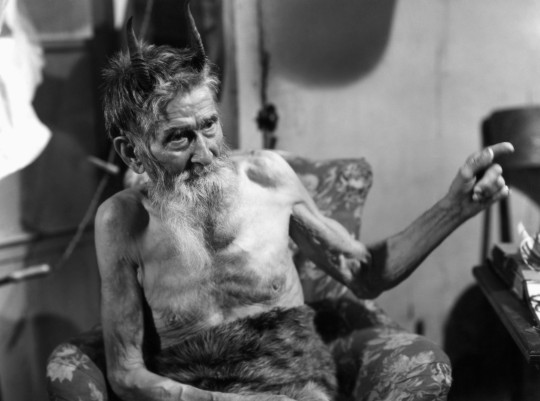
I have always suspected that THE MACHINE THAT KILLS BAD PEOPLE (originally titled La macchina ammazzacattivi) is overlooked not only because it is a comedy, but also because of the crudeness of the title’s English translation. And yet the film itself is inspired. Rossellini aims for a morbid farce of fantastical dimension, in which the devil—in the guise of Saint Andrew—goads a devout Catholic named Celestino into literally exterminate the “bad people” of his community with a hexed camera. It is far-fetched to be sure, but also well within the parameters of a comically enlivened Catholicism and grounded within the social realities of the coastal village of the film’s setting. The life of the village becomes Rossellini’s satirical playground, wherein he depicts the stratification of local politics according to histrionic self-interest. The incessant bickering over the allocation of great sums of money (much of which is conferred by the estates of those whom Celestino has killed) is both a wellspring of hilarity and a serious moral failure all at once.
FEAR (’54)

The films that Rossellini made with Ingrid Bergman are often positioned as a trilogy—STROMBOLI (’50), EUROPA ’51 (’52) and JOURNEY TO ITALY (’54) —despite the fact that he and his then-wife made a total of five features together. Based on the Stefan Zweig novel of the same name, FEAR (’54) may not boast the richness of the aforementioned three films (each of which places Bergman and her residual Hollywood glamor in direct contact with the roughhewn nature of her peasant life in Italy) but this inconspicuous drama is fascinating precisely because it sees Rossellini tackling a more conventional subject matter. Films about forbidden love and emotional blackmail were not uncommon in postwar Italy, but FEAR is unique in that, like GERMANY YEAR ZERO (’48), it channels its themes through the context of postwar reconstruction in Germany. Bergman, playing the wife of an eminent scientist (Mathias Wieman) who attempts to conceal from him that she has fallen for another man (Kurt Kreuger), no longer carries the ideological implications of her stardom—she simply acts the part and does it superbly.
#FilmStruck#Roberto Rossellini#Ingrid Bergman#L'amore#Fear#StreamLine Blog#Stuart Collier#Machine That Kills Bad People#italian neorealism
63 notes
·
View notes
Text





MATHIAS WIEMAN.
Filmography
1925: Freies Volk
1927: Der Sohn der Hagar
1927: Potsdam
1927: Mata Hari, die rote Tänzerin
1927: Königin Luise
1927: Feme, as Irrsinniger
1928: Königin Luise, 2. Teil
1928: Die Durchgängerin
1928: Unter der Laterne
1929: Tagebuch einer Kokotte
1929: Der fidele Bauer
1929: Das Land ohne Frauen
1930: Rosenmontag
1930: Stürme über dem Mont Blanc
1932: Zum goldenen Anker
1932: Das blaue Licht
1932: Die Gräfin von Monte-Christo
1932: L'Atlantide
1932: Die Herrin von Atlantis
1932: Mensch ohne Namen
1932: The Mistress of Atlantis
1933: Anna und Elisabeth
1933: Fräulein Hoffmanns Erzählungen
1933: Das Verliebte Hotel
1934: Der Schimmelreiter
1934: Achtung! Wer kennt diese Frau?
1934: Das Verlorene Tal
1934: Klein Dorrit
1935: Vorstadtvariete
1935: Die ewige Maske
1935: Viktoria
1937: Togger
1937: Patrioten, as Peter Thomann - genannt Pierre
1937: Unternehmen Michael
1938: Anna Favetti
1939: Die Hochzeitsreise
1939: Kadetten
1941: Ich klage an
1941: Das andere Ich
1943: Paracelsus,
1943: Man rede mir nicht von Liebe
1944: Träumerei
1944: Das Herz muß schweigen
1950: Wenn eine Frau liebt
1950: Melodie des Schicksals
1952: Ferientage - einmal anders (short film)
1952: Herz der Welt
1953: Solange Du gives bist
1953: Königliche Hoheit
1954: Unsere kleine Stadt
1954: Eine Liebesgeschichte
1954: Der letzte Sommer
1954: Non credo più all'amore
1955: Reifende Jugend
1956: Si tous les gars du monde
1956: Die Ehe des Dr. med. Danwitz
1957: The Legend of Robinson Crusoe
1957: Wetterleuchten um Maria
1961: Der entscheidende Augenblick
1963: Those who offend sex
1963: Erotikon
1964: Der Gefangene
1966: Geld und Geist.
Créditos: Tomado de Wikipedia
https://es.wikipedia.org/wiki/Mathias_Wieman
0 notes
Text
Ναζιστική προπαγάνδα: 15 σημαντικές ταινίες
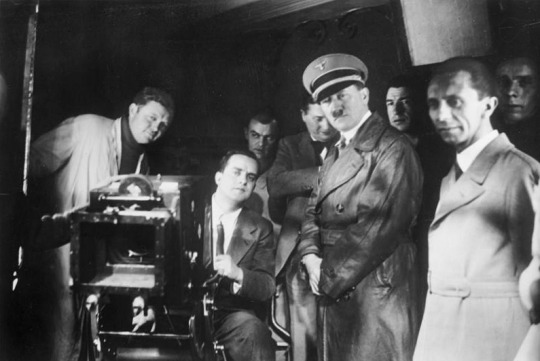

Η ναζιστική προπαγάνδα έπαιξε έναν σημαντικό ρόλο στην ιστορία του κινηματογράφου. Η ναζιστική προπαγάνδα, εγκαθιδρύθηκε από τον Joseph Goebbels, Υπουργό Προπαγάνδας του Τρίτου Ράιχ. Οι ταινίες της ναζιστικής προπαγάνδας είναι γεμάτες ιμπεριαλιστικά και μιλιταριστικά όνειρα, ενώ όλες οι ταινίες διαχέονται από μια έντονη καλλιτεχνική αύρα. Ο κύριος υπαίτιος για αυτήν την αύρα είναι οι σκηνοθέτες που βρισκόντουσαν πίσω από την κάμερα, όπως η Leni Riefenstahl, o G.W. Pabst, o Fritz Hippler κ.α. Όλοι τους, μεγάλοι ευεργέτες του σινεμά, σε μια εποχή που ο κινηματογράφος θεωρούταν ακόμα επιστήμη. Ο Χίτλερ είδε την δύναμη που περιέχει αυτή η επιστήμη και αποφάσισε να την μετατρέψει σε όπλο. Επιστράτευσε τους μεγαλύτερους Γερμανούς σκηνοθέτες της εποχής του και άνοιξε τα πανιά του, ώστε να φτιάξει το δικό του Hollywood. Αυτό το άρθρο δεν προωθεί τον ρατσισμό και τον αντισημιτισμό, είναι ένα άρθρο καθαρά κινηματογραφικό. Το άρθρο αναδεικνύει 15 σημαντικές ταινίες από την ναζιστική προπαγάνδα που για λόγους ιστορικούς και καλλιτεχνικούς, αξίζει να δει κάθε σινεφίλ αναγνώστης που σέβεται τον εαυτό του.
The Blue Light (1932)
Σκηνοθεσία: Leni Riefenstahl Πρωταγωνιστούν: Leni Riefenstahl, Mathias Wieman, Beni Fuhrer H Junta είναι μια μυστηριώδης και δυναμική γυναίκα, που την μισούν οι κάτοικοι του χωριού που μένει. Οι χωριάτες την θεωρούν μάγισσα καθώς είναι η μόνη που μπορεί να ανεβεί τα ψηλά βουνά, οπού εκεί βρίσκεται μια σπηλιά με ένα μπλε φως. Όσοι άνδρες ακολούθησαν την Junta στο βουνό, δεν επέστρεψαν ποτέ πίσω στο χωριό. Η Junta θα εκμυστηρευτεί το αρχαίο μυστικό του μπλε φωτός σε έναν άνδρα, θα καταφέρει όμως ο άνδρας να κρατήσει κρυφό τον όρκο τιμής; Το σκηνοθετικό ντεμπούτο της Leni Riefenstahl, ένα καλλιτεχνικό αριστούργημα με την δυναμική ματιά μιας παθιασμένης σκηνοθέτριας όπως ήταν η Riefenstahl. Μια από τις ταινίες της Riefenstahl, προτού ακόμα η ναζιστική προπαγάνδα της φανερώσει τα "δυνατά" της χαρτιά.
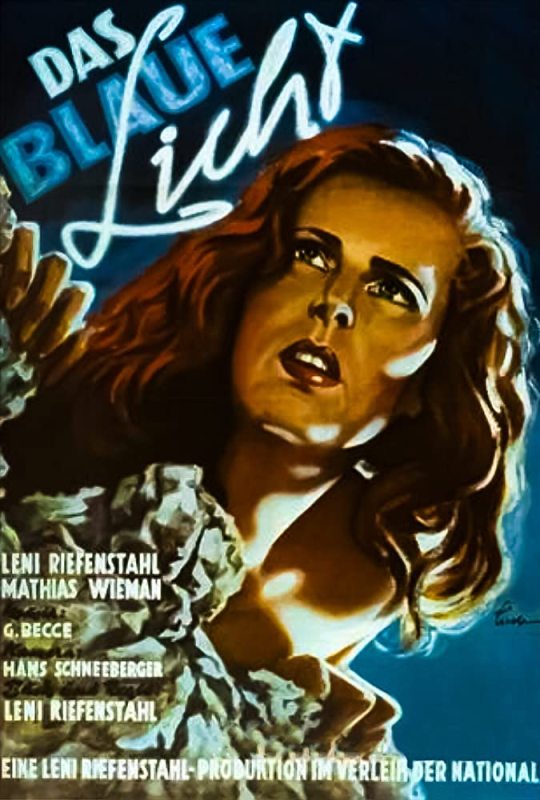
Πηγή εικόνας: imdb.com
Storm Trooper Brand (1933)
Σκηνοθεσία: Franz Seitz Πρωταγωνιστούν: Hein Kleigenberg, Wera Liesem, Rolf Wenkhaus Ένας οδηγός φορτηγού που δεν έχει στον ήλιο μοίρα, ακούει τις διδασκαλίες του Αδόλφου Χίτλερ και αποφασίζει να καταταγεί στο κίνημα του για να γίνει ένας περήφανος αξιωματικός. Ταυτοχρόνως πείθει τον Μαρξιστή πατέρα του, ώστε να τον ακολουθήσει στο σωστό μονοπάτι. Ο μικρός άνθρωπος που γίνεται μεγάλος μέσα από τα δίχτυα της ναζιστικής ιδεολογίας.

Πηγή εικόνας: imdb.com
Hans Westmar (1933)
Σκηνοθεσία: Franz Weszler Πρωταγωνιστούν: Emil Lohkamp, Paul Wegener, Heinrich Heilinger Η αληθινή ιστορία του Hans Westmar, ενός ναζί λοκατζή που πάλεψε ενάντια στους Κομουνιστές και πέθανε από αυτούς, προτού ολοκληρωθεί η ταινία.
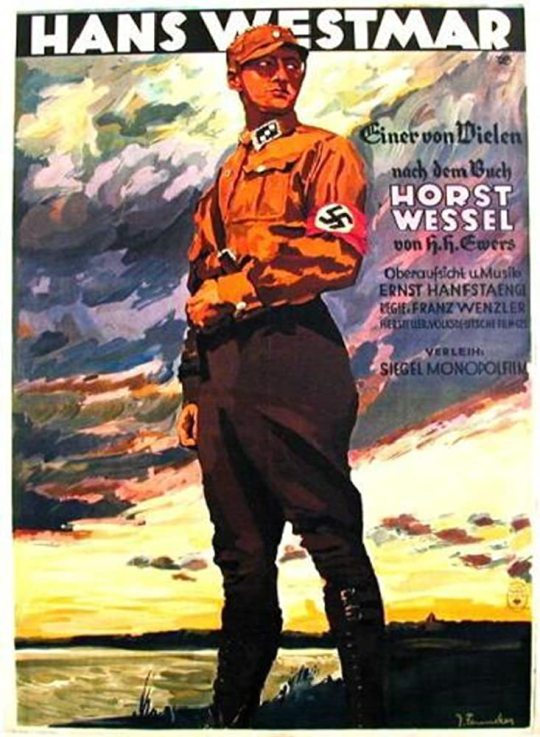
Πηγή εικόνας: imdb.com
Our Flags Lead us Forward (1933)
Σκηνοθεσία: Hans Steinhoff Πρωταγωνιστές: Heinrich George, Berta Drews, Jurgen Ohlsen Την περίοδο της παγκόσμιας οικονομικής ύφεσης, ο Vater είναι ένα μικρό αγόρι που βρίσκεται σε δίλημμα, καθώς θα πρέπει να αφοσιωθεί στην φροντίδα του άνεργου κομμουνιστή πατέρα του η να καταταγεί στην Χιτλερική νεολαία. Μια ιστορία ενηλικίωσης, με έναν έφηβο που προσπαθεί να βρει τον εαυτό του σε ένα χαώδες περιβάλλον.
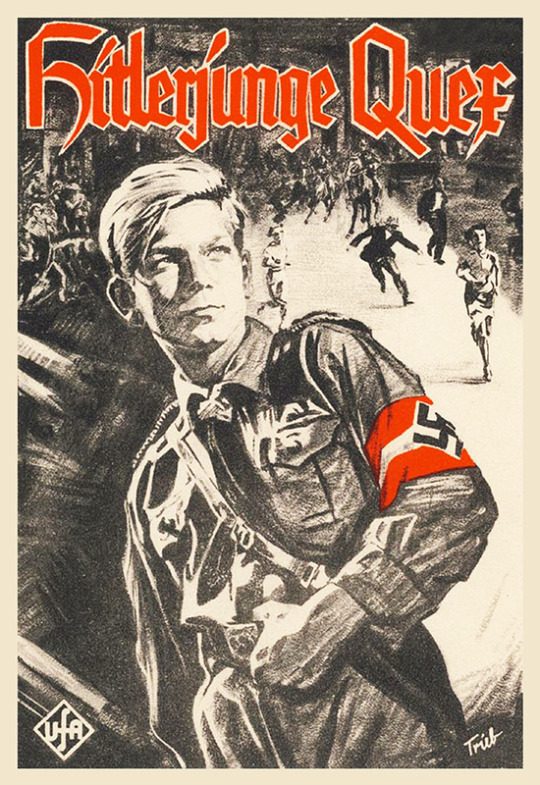
Πηγή εικόνας: imdb.com
Victory of Faith (1933)
Σκηνοθεσία: Leni Riefenstahl Πρωταγωνιστούν: Joseph Goebbels, Hermann Goring, Adolf Hitler To πρώτο ντοκιμαντέρ για την ναζιστική προπαγάνδα από την Leni Riefenstahl. Η ταινία έχει ένα ιδιαίτερο ιστορικό ενδιαφέρον, καθώς δείχνει τον Χίτλερ με τον Ερνστ Ρεμ σε μια ζεστή και φιλική στιγμή, προτού ο Ρεμ δολοφονηθεί με εντολές του Χίτλερ στην Νύχτα των Μεγάλων Μαχαιριών. Για χρόνια θεωρούταν χαμένη ταινία, καθώς ο Χίτλερ διέταξε την καταστροφή κάθε αντίτυπου. Τελικά, όμως μια κοπιά βρέθηκε την δεκαετία του ’90 στο Ηνωμένο Βασίλειο.
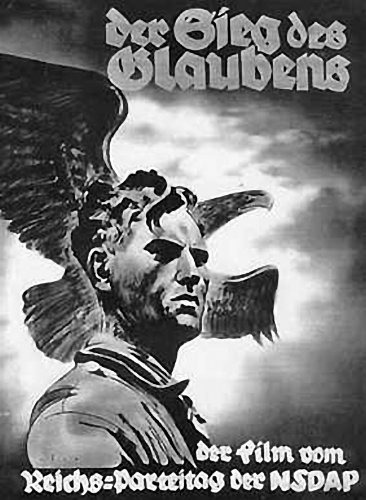
Πηγή εικόνας: imdb.com
The Prodigal Son (1934)
Σκηνοθεσία: Luis Trenker Πρωταγωνιστούν: Luis Trenker, Maria Andergast, Bertl Schultes Ο Tonio είναι ένας μετανάστης, ο οποίος κατά την περίοδο της Μεγάλης Κρίσης, πήγε στην Νέα Υόρκη. Η ζωή εκεί όμως δεν του άρεσε, για αυτό επιστρέφει στην πατρίδα του την Γερμανία για να ξαναφτιάξει από την αρχή το σπίτι του. Μια από τις πιο σημαντικές δραματικές ταινίες που μας πρόσφερε η ναζιστική προπαγάνδα.
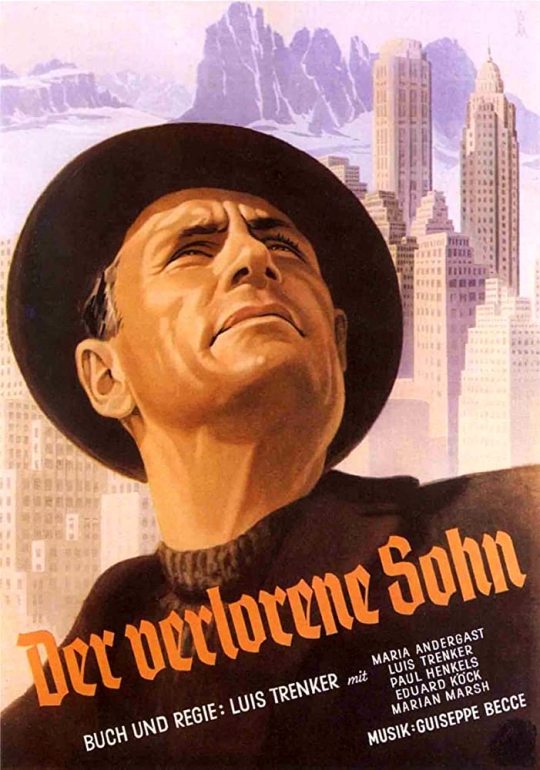
Πηγή εικόνας: imdb.com
Master of the World (1934)
Σκηνοθεσία: Harry Piel Πρωταγωνιστούν: Walter Janssen, Sybille Schmitz, Walter Franck Ένας Γερμανός γιατρός κατασκευάζει ένα μηχάνημα το οποίο θα κάνει όλες τις δύσκολες δουλείες των ανθρώπων. Όμως, το μηχάνημα αρχίζει να παίρνει τον έλεγχο και οι ζωές των ανθρώπων βρίσκονται σε κίνδυνο. Μια από τις ταινίες επιστημονικής φαντασίας που μας πρόσφερε η ναζιστική προπαγάνδα.
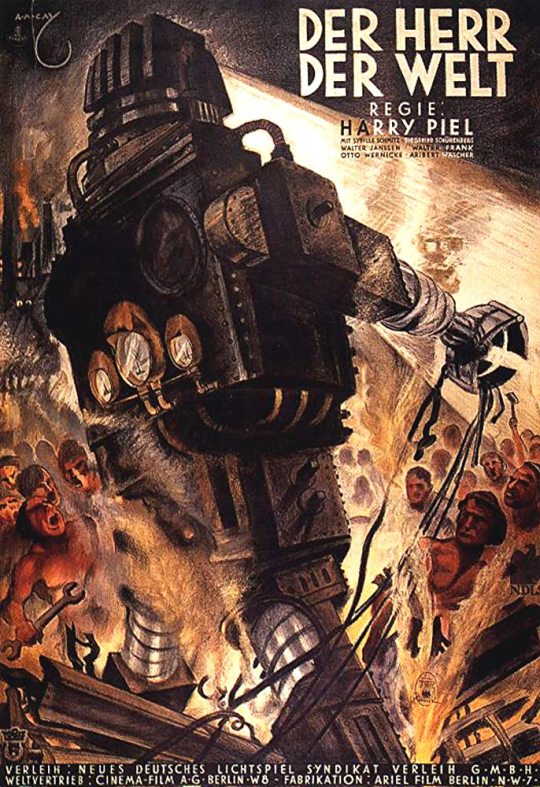
Πηγή εικόνας: imdb.com
Triumph of the Will (1935)
Σκηνοθεσία: Leni Riefenstahl Πρωταγωνιστούν: Adolf Hitler, Hermann Goring, Max Amann Το αριστουργηματικό ντοκιμαντέρ της Riefenstahl, ένα συγκλονιστικό ντοκουμέντο και με μια απίστευτη εικαστική δεινότητα που μέχρι και ��ήμερα παραμένει δυνατή. Αυτό είναι το "διαμάντι" που η ναζιστική προπαγάνδα άφησε πίσω της.
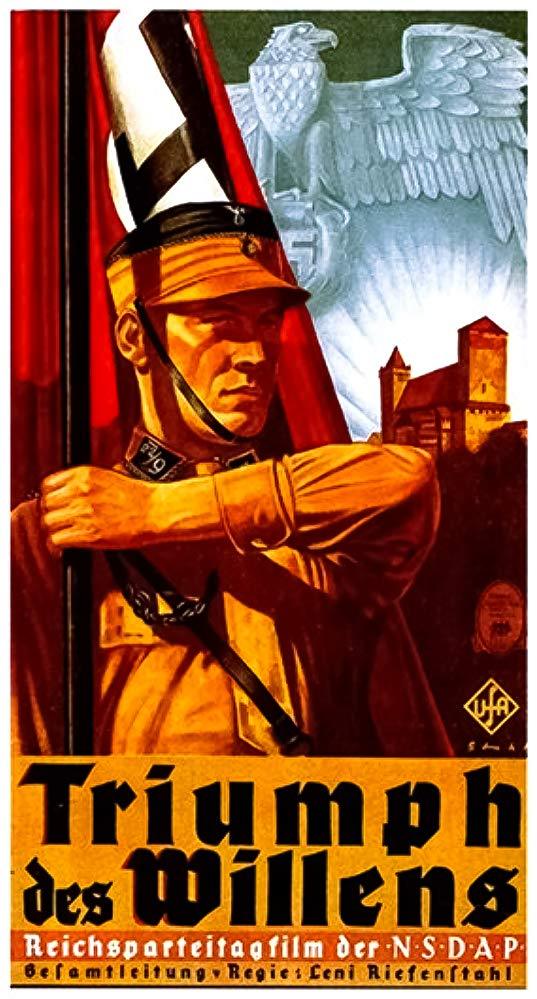
Πηγή εικόνας: imdb.com
Joan of Arc (1935)
Σκηνοθεσία: Gustav Ucicky Πρωταγωνιστούν: Angela Salloker, Gustaf Grudgens, Heinrich George Η ιστορία της Ιωάννας της Λωρραίνης ξαναζωντανεύει μέσα από τα πρότυπα της Εθνικοσοσιαλιστικής ιδεολογίας.
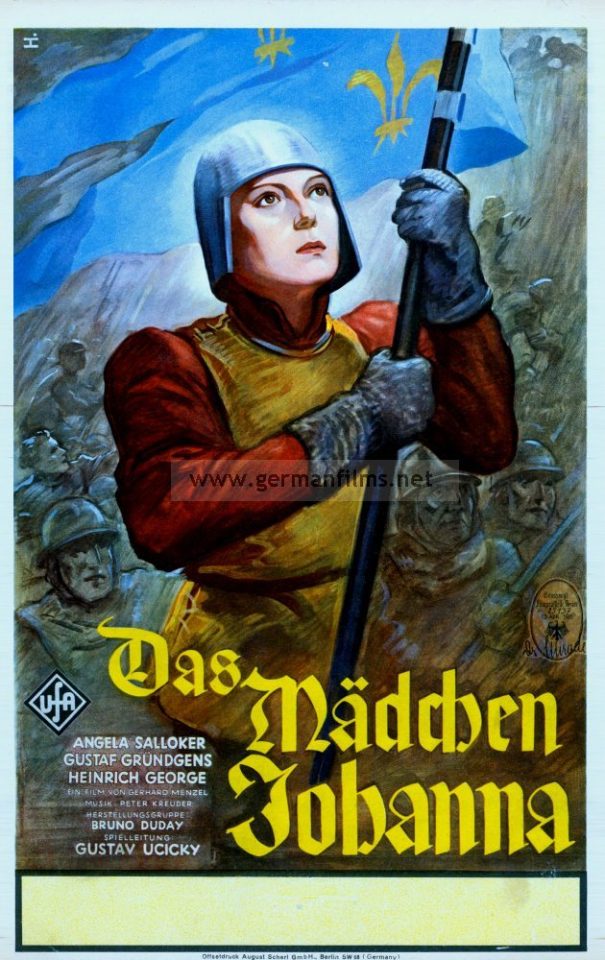
Πηγή εικόνας: imdb.com
Olympia Part One: Festival of the Nations (1938)
Σκηνοθεσία: Leni Riefenstahl Πρωταγωνιστούν: David Albritton, Arvo Askola, Jack Bersford Οι ολυμπιακοί αγώνες που διεξάχθηκαν στο Βερολίνο του 1936, μέσα από την διορατική ματιά της Leni Riefenstahl. Απέκτησε και ένα δεύτερο μέρος, που στην ουσία είναι η ίδια ταινία απλά με περισσότερα καλλίγραμμά σώματα και αρρενωπά πρόσωπα, ώστε η ναζιστική προπαγάνδα να επιδείξει την τελειότητα στο ανθρώπινο σώμα. Ο τίτλος της ταινίας είναι, Olympia Part Two: Festival of Beauty (1938).
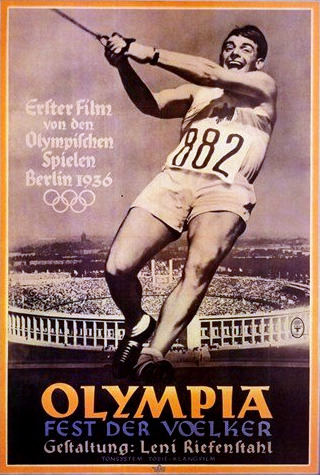
Πηγή εικόνας: imdb.com
The Eternal Jew (1940)
Σκηνοθεσία: Fritz Hippler Πρωταγωνιστούν: Curt Bois, Charles Chaplin, Alber Einstein Ο "Αιώνιος Εβραίος", το ντοκιμαντέρ που παρουσιάζει τους Εβραίους σαν παράσιτα και τους συγκρίνει με τους αρουραίους. Ένα σκοτεινό και αποκρουστικό πολιτικό μανιφέστο που έχει περισσότερο ιστορική αξία παρά καλλιτεχνική. Έχει πολύ ενδιαφέρον να το δείτε (αν το αντέξετε) για να παρατήρησε τις τεχνικές εκφοβισμού που χρησιμοποιεί ο Hippler, ώστε να επηρεάσει τις μάζες των θεατών.
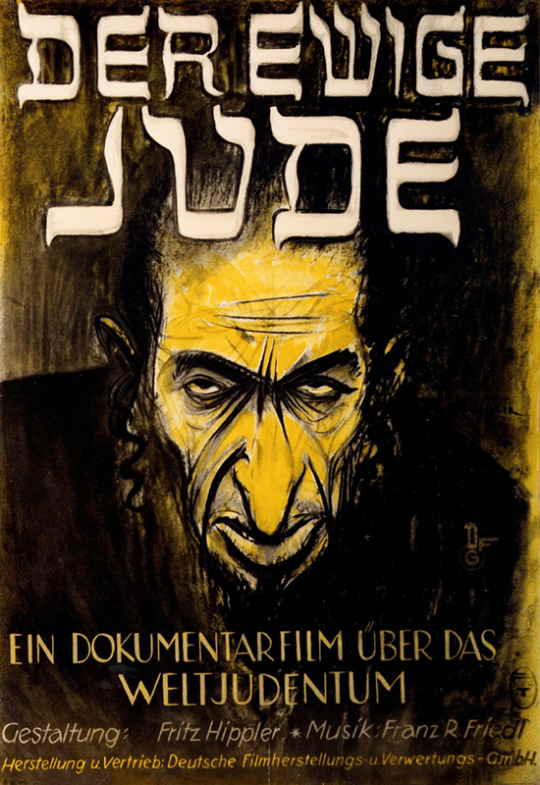
Πηγή εικόνας: imdb.com
Jew Suss (1940)
Σκηνοθεσία: Veit Harlan Πρωταγωνιστούν: Ferdinand Marian, Kristina Soderbaum, Heinrich George Μια ακόμα ταινία προπαγάνδας κατά των Εβραίων, οπού πρωταγωνιστής είναι ένας σατανικός Εβραίος έμπορος που εκμεταλλεύεται τον Δούκα της Βυρτεμβέργης, ώστε να του κάνει πανούργα θελήματα.
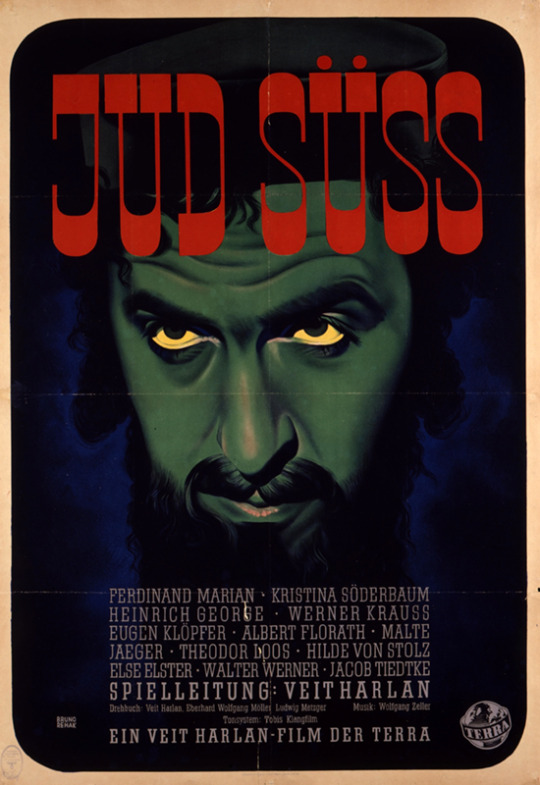
Πηγή εικόνας: imdb.com
The Rothschilds (1940)
Σκηνοθεσία: Erich Waschneck Πρωταγωνιστούν: Erich Ponto, Carl Kuhlmann, Albert Lippert Μια αντισημιτική βιογραφία για την μεγαλύτερη οικογένεια τραπεζιτών στον κόσμο. Μια ταινία "βάλσαμο" για τους συνωμοσιολόγους.
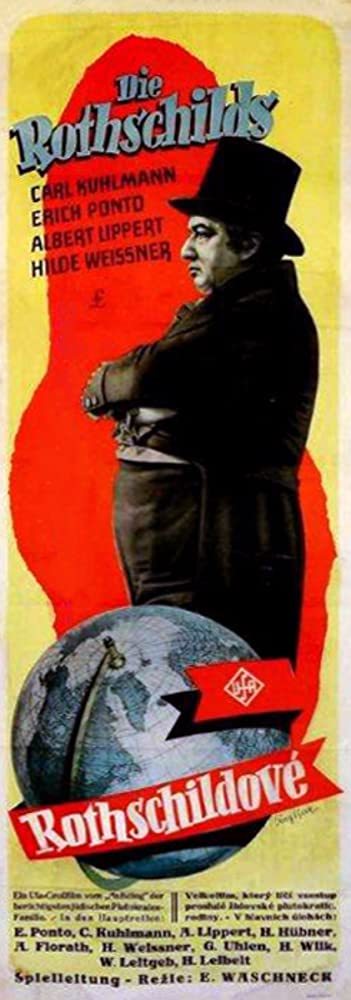
Πηγή εικόνας: imdb.com
Paracelsus (1943)
Σκηνοθεσία: G.W. Pabst Πρωταγωνιστούν: Werner Krauss, Harry Langewisch, Annelies Reinhold Η ζωή και το έργο του αλχημιστή γιατρού Θεόφραστου Παράκελσου, μια από τις ταινίες που ο σκηνοθέτης G.W. Pabst, κατάφερε να την απελευθερώσει από την ναζιστική προπαγάνδα, κάνοντας το Paracelsus μια ακόμα παρεξηγημένη καλλιτεχνική ταινία, πνιγμένη ανάμεσα σε αντισημιτικές χυδαιότητες που προκαλούσαν τον τρόμο και το μίσος. Η ταινία περιέχει μια εξαιρετική σκηνή, που μετ��πειτα ιστορικοί κινηματογράφου την ονόμασαν “The Dance of Death”(Ο Χορός του Θανάτου).

Πηγή εικόνας: imdb.com
Kolberg (1945)
Σκηνοθεσία: Veit Harlan Πρωταγωνιστούν: Kristina Soderbaum, Heinrich George, Paul Wegener Μια από τις τελευταίες ταινίες της ναζιστικής προπαγάνδας, η ταινία αφηγείται την μάχη της πόλης Kloberg ενάντια στα Γαλλικά στρατεύματα του Ναπολέοντα.
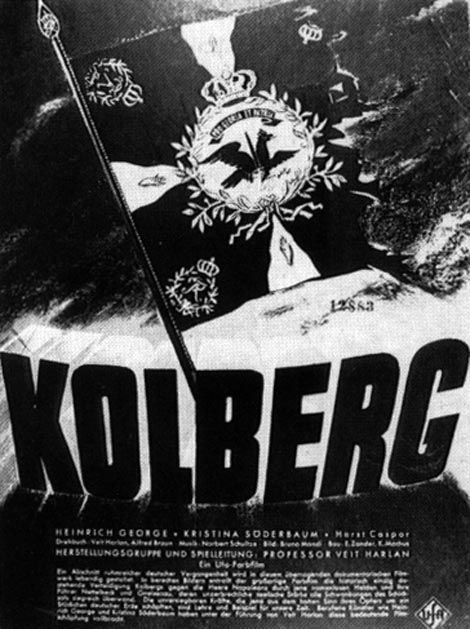
Πηγή εικόνας: imdb.com Read the full article
#JoanofArc#MasteroftheWorld#Paracelsus#TheBlueLight#TheEternalJew#TheRothschilds#TriumphoftheWill#Ολύμπια#ταινιέςμεναζί
0 notes
Text
Ναζιστική προπαγάνδα: 15 σημαντικές ταινίες
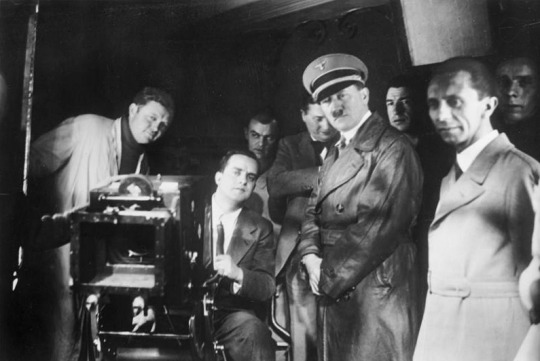

Η ναζιστική προπαγάνδα έπαιξε έναν σημαντικό ρόλο στην ιστορία του κινηματογράφου. Η ναζιστική προπαγάνδα, εγκαθιδρύθηκε από τον Joseph Goebbels, Υπουργό Προπαγάνδας του Τρίτου Ράιχ. Οι ταινίες της ναζιστικής προπαγάνδας είναι γεμάτες ιμπεριαλιστικά και μιλιταριστικά όνειρα, ενώ όλες οι ταινίες διαχέονται από μια έντονη καλλιτεχνική αύρα. Ο κύριος υπαίτιος για αυτήν την αύρα είναι οι σκηνοθέτες που βρισκόντουσαν πίσω από την κάμερα, όπως η Leni Riefenstahl, o G.W. Pabst, o Fritz Hippler κ.α. Όλοι τους, μεγάλοι ευεργέτες του σινεμά, σε μια εποχή που ο κινηματογράφος θεωρούταν ακόμα επιστήμη. Ο Χίτλερ είδε την δύναμη που περιέχει αυτή η επιστήμη και αποφάσισε να την μετατρέψει σε όπλο. Επιστράτευσε τους μεγαλύτερους Γερμανούς σκηνοθέτες της εποχής του και άνοιξε τα πανιά του, ώστε να φτιάξει το δικό του Hollywood. Αυτό το άρθρο δεν προωθεί τον ρατσισμό και τον αντισημιτισμό, είναι ένα άρθρο καθαρά κινηματογραφικό. Το άρθρο αναδεικνύει 15 σημαντικές ταινίες από την ναζιστική προπαγάνδα που για λόγους ιστορικούς και καλλιτεχνικούς, αξίζει να δει κάθε σινεφίλ αναγνώστης που σέβεται τον εαυτό του.
The Blue Light (1932)
Σκηνοθεσία: Leni Riefenstahl Πρωταγωνιστούν: Leni Riefenstahl, Mathias Wieman, Beni Fuhrer H Junta είναι μια μυστηριώδης και δυναμική γυναίκα, που την μισούν οι κάτοικοι του χωριού που μένει. Οι χωριάτες την θεωρούν μάγισσα καθώς είναι η μόνη που μπορεί να ανεβεί τα ψηλά βουνά, οπού εκεί βρίσκεται μια σπηλιά με ένα μπλε φως. Όσοι άνδρες ακολούθησαν την Junta στο βουνό, δεν επέστρεψαν ποτέ πίσω στο χωριό. Η Junta θα εκμυστηρευτεί το αρχαίο μυστικό του μπλε φωτός σε έναν άνδρα, θα καταφέρει όμως ο άνδρας να κρατήσει κρυφό τον όρκο τιμής; Το σκηνοθετικό ντεμπούτο της Leni Riefenstahl, ένα καλλιτεχνικό αριστούργημα με την δυναμ��κή ματιά μιας παθιασμένης σκηνοθέτριας όπως ήταν η Riefenstahl. Μια από τις ταινίες της Riefenstahl, προτού ακόμα η ναζιστική προπαγάνδα της φανερώσει τα "δυνατά" της χαρτιά.

Πηγή εικόνας: imdb.com
Storm Trooper Brand (1933)
Σκηνοθεσία: Franz Seitz Πρωταγωνιστούν: Hein Kleigenberg, Wera Liesem, Rolf Wenkhaus Ένας οδηγός φορτηγού που δεν έχει στον ήλιο μοίρα, ακούει τις διδασκαλίες του Αδόλφου Χίτλερ και αποφασίζει να καταταγεί στο κίνημα του για να γίνει ένας περήφανος αξιωματικός. Ταυτοχρόνως πείθει τον Μαρξιστή πατέρα του, ώστε να τον ακολουθήσει στο σωστό μονοπάτι. Ο μικρός άνθρωπος που γίνεται μεγάλος μέσα από τα δίχτυα της ναζιστικής ιδεολογίας.
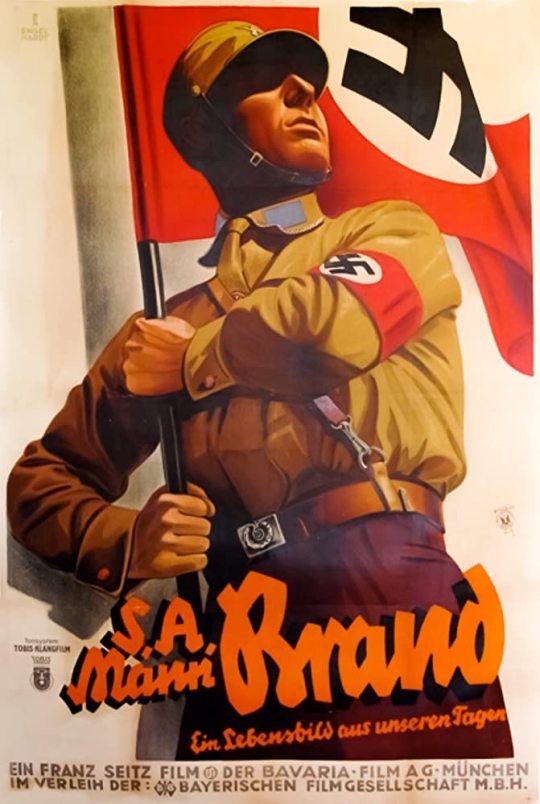
Πηγή εικόνας: imdb.com
Hans Westmar (1933)
Σκηνοθεσία: Franz Weszler Πρωταγωνιστούν: Emil Lohkamp, Paul Wegener, Heinrich Heilinger Η αληθινή ιστορία του Hans Westmar, ενός ναζί λοκατζή που πάλεψε ενάντια στους Κομουνιστές και πέθανε από αυτούς, προτού ολοκληρωθεί η ταινία.
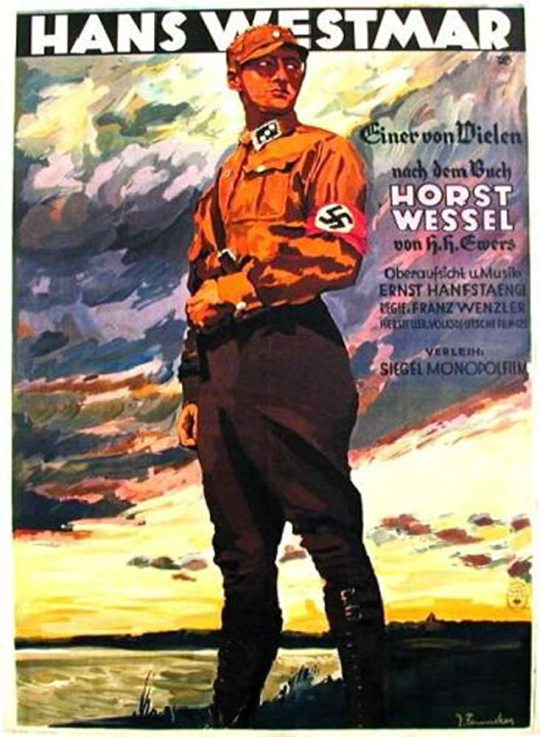
Πηγή εικόνας: imdb.com
Our Flags Lead us Forward (1933)
Σκηνοθεσία: Hans Steinhoff Πρωταγωνιστές: Heinrich George, Berta Drews, Jurgen Ohlsen Την περίοδο της παγκόσμιας οικονομικής ύφεσης, ο Vater είναι ένα μικρό αγόρι που βρίσκεται σε δίλημμα, καθώς θα πρέπει να αφοσιωθεί στην φροντίδα του άνεργου κομμουνιστή πατέρα του η να καταταγεί στην Χιτλερική νεολαία. Μια ιστορία ενηλικίωσης, με έναν έφηβο που προσπαθεί να βρει τον εαυτό του σε ένα χαώδες περιβάλλον.
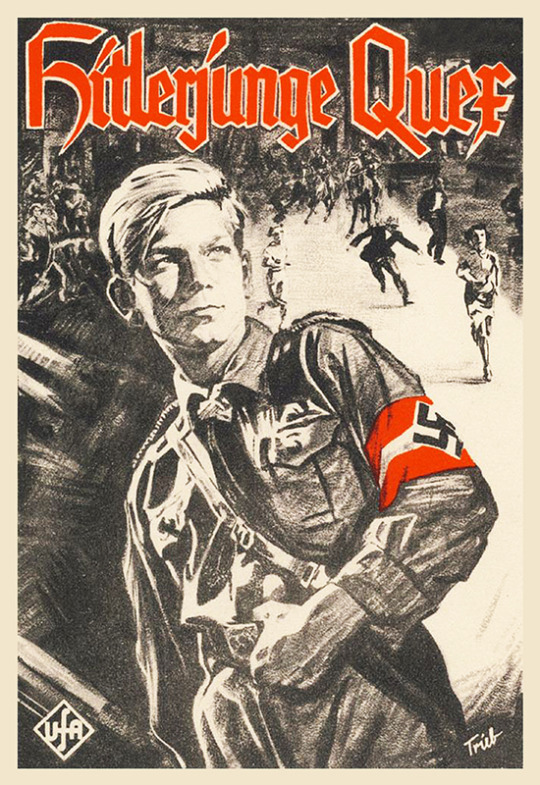
Πηγή εικόνας: imdb.com
Victory of Faith (1933)
Σκηνοθεσία: Leni Riefenstahl Πρωταγωνιστούν: Joseph Goebbels, Hermann Goring, Adolf Hitler To πρώτο ντοκιμαντέρ για την ναζιστική προπαγάνδα από την Leni Riefenstahl. Η ταινία έχει ένα ιδιαίτερο ιστορικό ενδιαφέρον, καθώς δείχνει τον Χίτλερ με τον Ερνστ Ρεμ σε μια ζεστή και φιλική στιγμή, προτού ο Ρεμ δολοφονηθεί με εντολές του Χίτλερ στην Νύχτα των Μεγάλων Μαχαιριών. Για χρόνια θεωρούταν χαμένη ταινία, καθώς ο Χίτλερ διέταξε την καταστροφή κάθε αντίτυπου. Τελικά, όμως μια κοπιά βρέθηκε την δεκαετία του ’90 στο Ηνωμένο Βασίλειο.
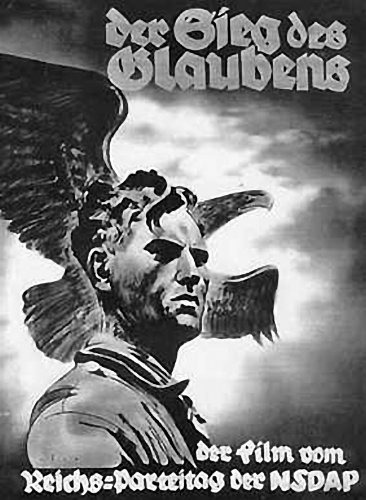
Πηγή εικόνας: imdb.com
The Prodigal Son (1934)
Σκηνοθεσία: Luis Trenker Πρωταγωνιστούν: Luis Trenker, Maria Andergast, Bertl Schultes Ο Tonio είναι ένας μετανάστης, ο οποίος κατά την περίοδο της Μεγάλης Κρίσης, πήγε στην Νέα Υόρκη. Η ζωή εκεί όμως δεν του άρεσε, για αυτό επιστρέφει στην πατρίδα του την Γερμανία για να ξαναφτιάξει από την αρχή το σπίτι του. Μια από τις πιο σημαντικές δραματικές ταινίες που μας πρόσφερε η ναζιστική προπαγάνδα.

Πηγή εικόνας: imdb.com
Master of the World (1934)
Σκηνοθεσία: Harry Piel Πρωταγωνιστούν: Walter Janssen, Sybille Schmitz, Walter Franck Ένας Γερμανός γιατρός κατασκευάζει ένα μηχάνημα το οποίο θα κάνει όλες τις δύσκολες δουλείες των ανθρώπων. Όμως, το μηχάνημα αρχίζει να παίρνει τον έλεγχο και οι ζωές των ανθρώπων βρίσκονται σε κίνδυνο. Μια από τις ταινίες επιστημονικής φαντασίας που μας πρόσφερε η ναζιστική προπαγάνδα.
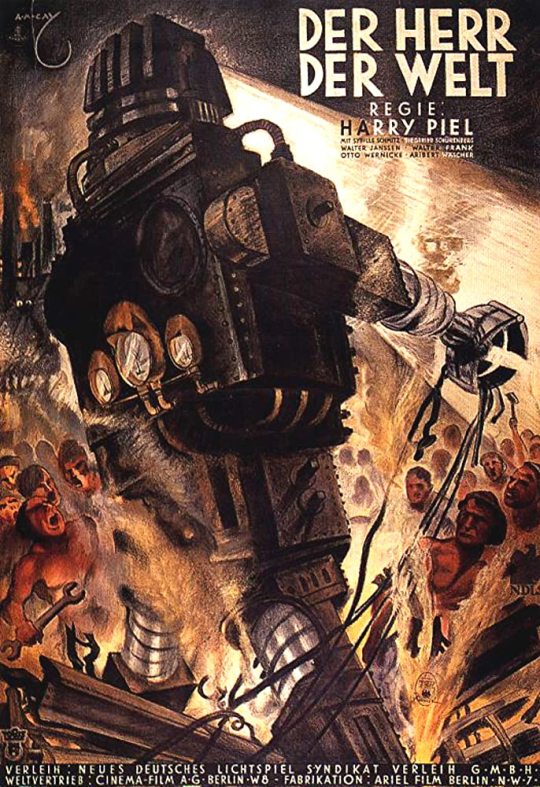
Πηγή εικόνας: imdb.com
Triumph of the Will (1935)
Σκηνοθεσία: Leni Riefenstahl Πρωταγωνιστούν: Adolf Hitler, Hermann Goring, Max Amann Το αριστουργηματικό ντοκιμαντέρ της Riefenstahl, ένα συγκλονιστικό ντοκουμέντο και με μια απίστευτη εικαστική δεινότητα που μέχρι και σήμερα παραμένει δυνατή. Αυτό είναι το "διαμάντι" που η ναζιστική προπαγάνδα άφησε πίσω της.
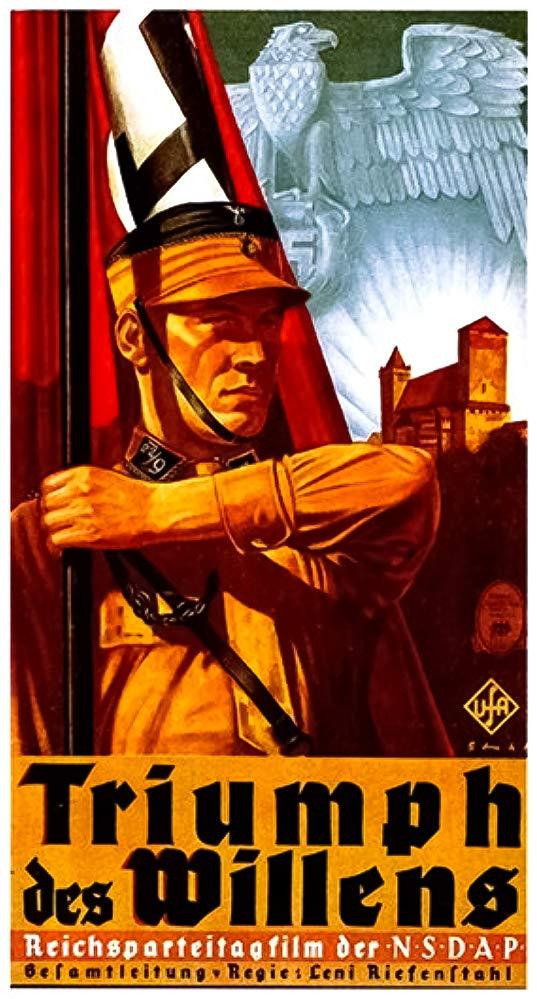
Πηγή εικόνας: imdb.com
Joan of Arc (1935)
Σκηνοθεσία: Gustav Ucicky Πρωταγωνιστούν: Angela Salloker, Gustaf Grudgens, Heinrich George Η ιστορία της Ιωάννας της Λωρραίνης ξαναζωντανεύει μέσα από τα πρότυπα της Εθνικοσοσιαλιστικής ιδεολογίας.
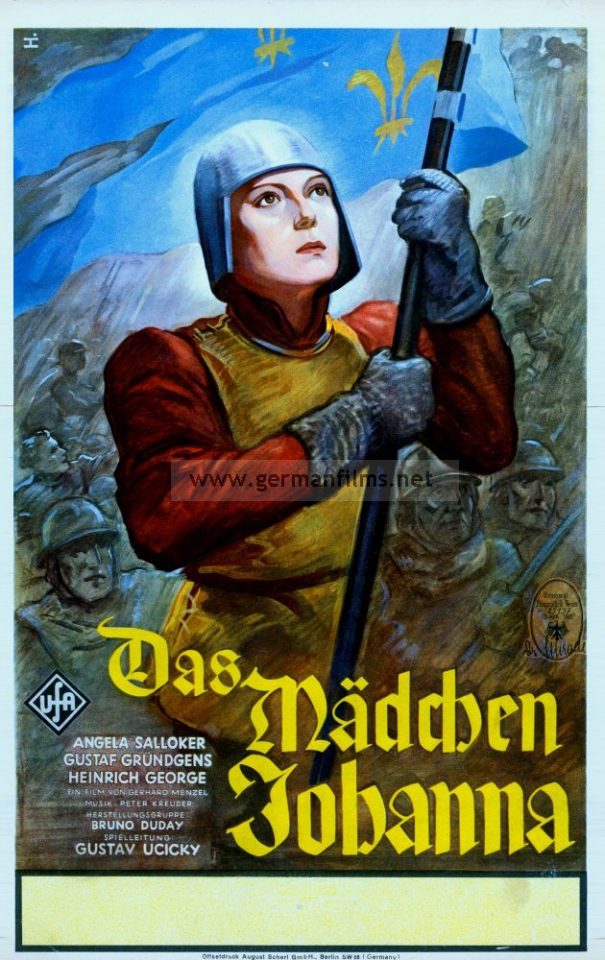
Πηγή εικόνας: imdb.com
Olympia Part One: Festival of the Nations (1938)
Σκηνοθεσία: Leni Riefenstahl Πρωταγωνιστούν: David Albritton, Arvo Askola, Jack Bersford Οι ολυμπιακοί αγώνες που διεξάχθηκαν στο Βερολίνο του 1936, μέσα από την διορατική ματιά της Leni Riefenstahl. Απέκτησε και ένα δεύτερο μέρος, που στην ουσία είναι η ίδια ταινία απλά με περισσότερα καλλίγραμμά σώματα και αρρενωπά πρόσωπα, ώστε η ναζιστική προπαγάνδα να επιδείξει την τελειότητα στο ανθρώπινο σώμα. Ο τίτλος της ταινίας είναι, Olympia Part Two: Festival of Beauty (1938).
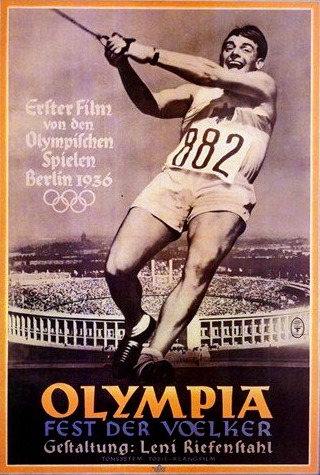
Πηγή εικόνας: imdb.com
The Eternal Jew (1940)
Σκηνοθεσία: Fritz Hippler Πρωταγωνιστούν: Curt Bois, Charles Chaplin, Alber Einstein Ο "Αιώνιος Εβραίος", το ντοκιμαντέρ που παρουσιάζει τους Εβραίους σαν παράσιτα και τους συγκρίνει με τους αρουραίους. Ένα σκοτεινό και αποκρουστικό πολιτικό μανιφέστο που έχει περισσότερο ιστορική αξία παρά καλλιτεχνική. Έχει πολύ ενδιαφέρον να το δείτε (αν το αντέξετε) για να παρατήρησε τις τεχνικές εκφοβισμού που χρησιμοποιεί ο Hippler, ώστε να επηρεάσει τις μάζες των θεατών.

Πηγή εικόνας: imdb.com
Jew Suss (1940)
Σκηνοθεσία: Veit Harlan Πρωταγωνιστούν: Ferdinand Marian, Kristina Soderbaum, Heinrich George Μια ακόμα ταινία προπαγάνδας κατά των Εβραίων, οπού πρωταγωνιστής είναι ένας σατανικός Εβραίος έμπορος που εκμεταλλεύεται τον Δούκα της Βυρτεμβέργης, ώστε να του κάνει πανούργα θελήματα.
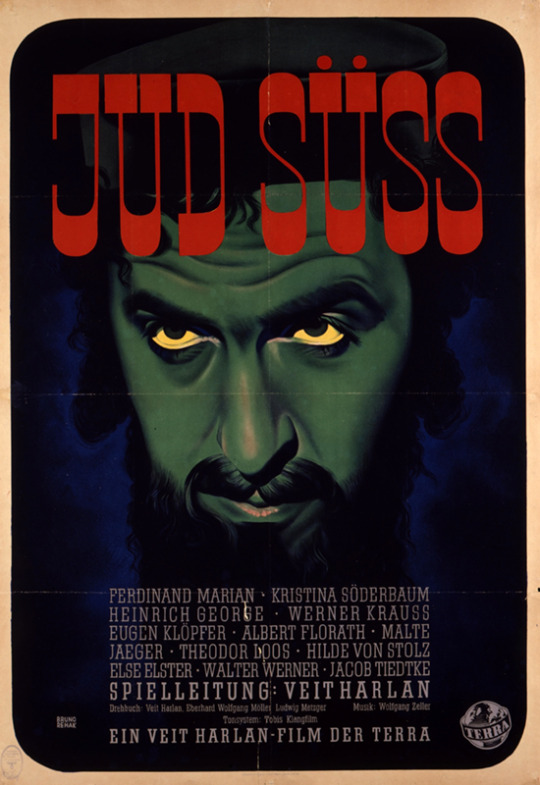
Πηγή εικόνας: imdb.com
The Rothschilds (1940)
Σκηνοθεσία: Erich Waschneck Πρωταγωνιστούν: Erich Ponto, Carl Kuhlmann, Albert Lippert Μια αντισημιτική βιογραφία για την μεγαλύτερη οικογένεια τραπεζιτών στον κόσμο. Μια ταινία "βάλσαμο" για τους συνωμοσιολόγους.
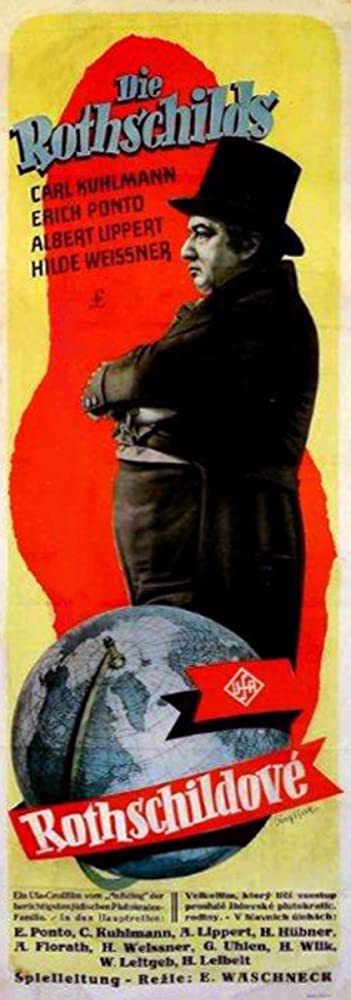
Πηγή εικόνας: imdb.com
Paracelsus (1943)
Σκηνοθεσία: G.W. Pabst Πρωταγωνιστούν: Werner Krauss, Harry Langewisch, Annelies Reinhold Η ζωή και το έργο του αλχημιστή γιατρού Θεόφραστου Παράκελσου, μια από τις ταινίες που ο σκηνοθέτης G.W. Pabst, κατάφερε να την απελευθερώσει από την ναζιστική προπαγάνδα, κάνοντας το Paracelsus μια ακόμα παρεξηγημένη καλλιτεχνική ταινία, πνιγμένη ανάμεσα σε αντισημιτικές χυδαιότητες που προκαλούσαν τον τρόμο και το μίσος. Η ταινία περιέχει μια εξαιρετική σκηνή, που μετέπειτα ιστορικοί κινηματογράφου την ονόμασαν “The Dance of Death”(Ο Χορός του Θανάτου).
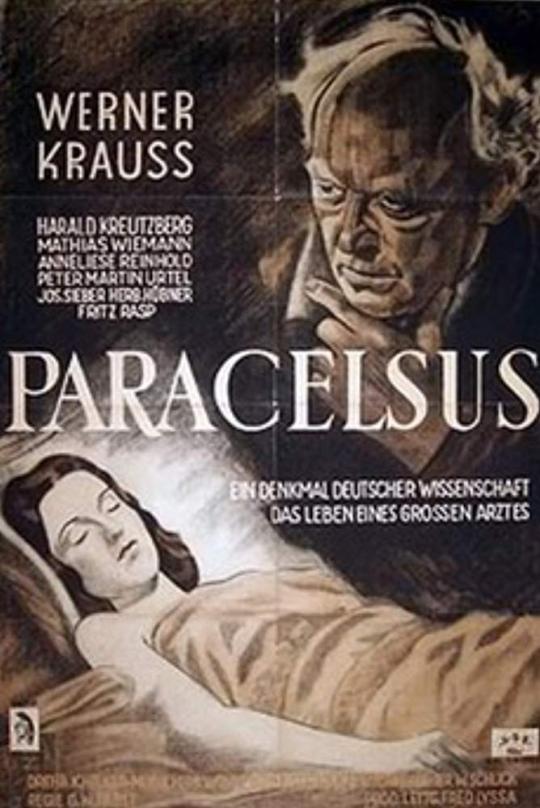
Πηγή εικόνας: imdb.com
Kolberg (1945)
Σκηνοθεσία: Veit Harlan Πρωταγωνιστούν: Kristina Soderbaum, Heinrich George, Paul Wegener Μια από τις τελευταίες ταινίες της ναζιστικής προπαγάνδας, η ταινία αφηγείται την μάχη της πόλης Kloberg ενάντια στα Γαλλικά στρατεύματα του Ναπολέοντα.

Πηγή εικόνας: imdb.com Read the full article
#JoanofArc#MasteroftheWorld#Paracelsus#TheBlueLight#TheEternalJew#TheRothschilds#TriumphoftheWill#Ολύμπια#ταινιέςμεναζί
1 note
·
View note
Photo


Dorothea Wieck’s and Mathias Wieman’s addresses and phone numbers (1932).
They were on the same page a few people apart so I decided to post both. Anna und Elisabeth was in 1933, though. Plus, DW married on 13.9.1932, then run away (immediately?) and returned a week later. No idea when exactly the (month) the information had been published, plus as far as I remember Ernst von der Decken (DW’s husband) was film critic in a daily newspaper in Berlin (maybe I’m wrong, but only about the city.)
Added soon after: ** means "Ganzseitige Biographie" \ "Page Biography" (the note is in both languages) (somewhere inside the whole issue.)
2 notes
·
View notes
Photo


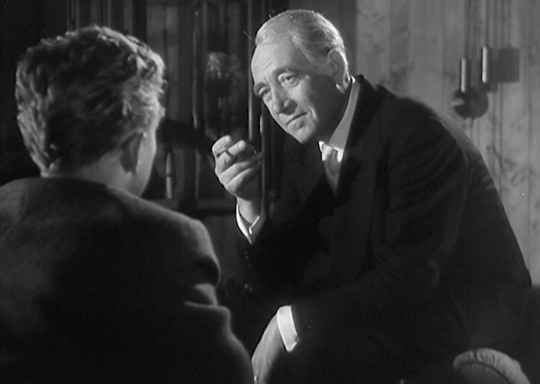
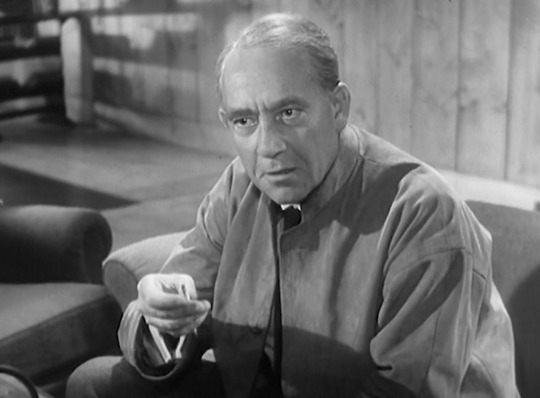
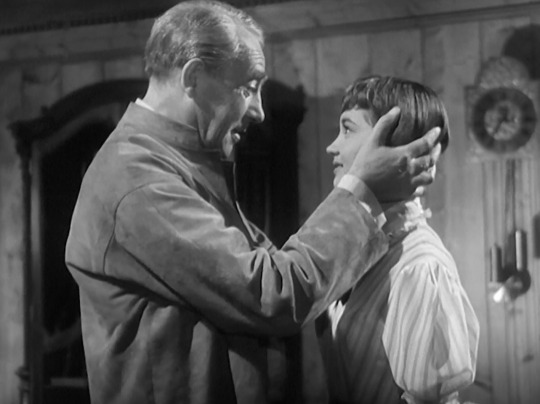
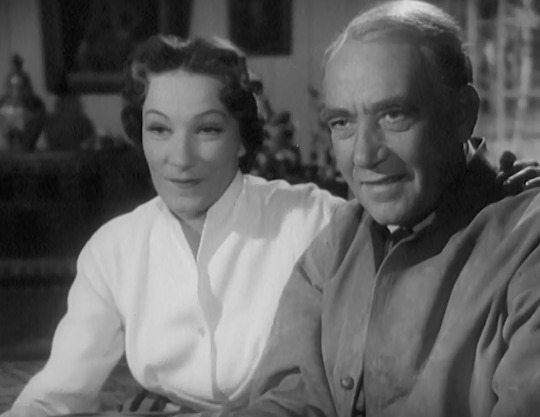

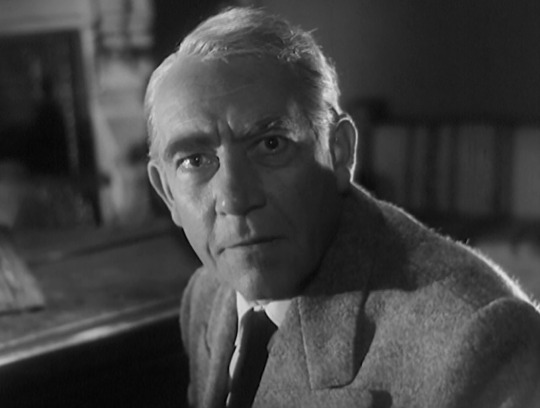
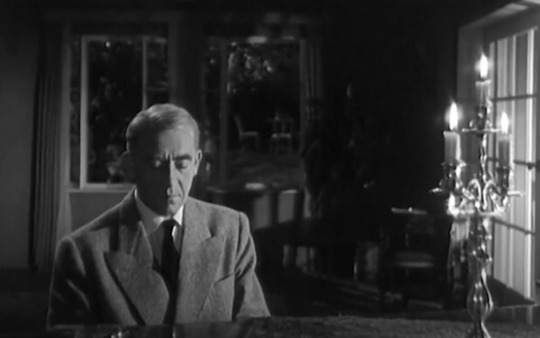
“Sie wollen doch das neue Leben auf Erden, nicht? Fängt das mit Sterben an? Die Menschen erschrecken und sie in Angst halten, ist das jung? Ist das mutig? Aber an die Menschen zu glauben, immer noch, nach allem, was wir täglich von ihnen erleben, dazu gehört eine ganze Menge Mut.”
“Der letzte Sommer” (1954) von Harald Braun
In einem nicht genannten Land - einige Namen der handelnden Personen muten skandinavisch an - stellt sich Staatspräsident Carlo Tolemainen (Mathias Wieman) nach achtjähriger Amtszeit erneut dem Votum seiner Bürger. Doch der allseits respektierte Politiker hat auch Feinde. Einer von ihnen ist der Student Rikola Valbo (Hardy Krüger), der gemeinsam mit dem Arbeiter Gawan Massi (Renè Deltgen) ein Attentat gegen Tolemainen plant. Gawans Schwester Anja (Nadja Tiller) ist in ihr Vorhaben eingeweiht.
Rikola macht die Bekanntschaft der jungen Jessika (Liselotte Pulver) und verliebt sich in sie, ohne zu ahnen, dass es sich bei ihr um die älteste Tochter seines potentiellen Opfers handelt. Als er Jessika auf der für das Attentat manipulierten Holzbrücke erblickt, warnt er sie. Gawan flieht aus seinem Versteck, die Brücke stürzt in sich zusammen.
Tolemainen ist tief betroffen über den Anschlag, mehr noch jedoch über die Gefahr, in der sich seine Tochter Jessika befand. Seine Frau Tatjana (Brigitte Horney) und seine jüngere Tochter Katja (Uta Hallant) sind überglücklich über seine Rettung.
Während der Innenminister (Werner Hinz) umgehend drakonische Maßnahmen gegen die Opposition ergreifen möchte, lehnt Tolemainen dies ausdrücklich ab.
Rikola wird in das Landhaus des Präsidenten eingeladen, da er als dessen Retter gilt. Der ziellose junge Mann erlebt erstmals familiäre Güte und führt mit Tolemainen eine politische Grundsatzdebatte. Der Präsident steht auf dem Standpunkt, dass eine erträgliche Staatsform bereits ein annehmbares Ziel sei, während paradiesische Gesellschaftszustände lediglich von Radikalen versprochen würden. Tolemainens Credo besteht darin, Menschen niemals für ein “höheres Ideal” zu etwas zu zwingen, während Rikola meint, dass der Zweck alle Mittel heilige.
Bei einer Entenjagd versucht Rikola, Tolemainen zu erschießen, kann dies jedoch nicht über sich bringen. Statt dessen wird der polizeilich gesuchte Gawan in seinem Versteck aufgespürt und erschossen. Seine Schwester Anja schweigt im Verhör mit Kommissar Berki (Leonard Steckel) hartnäckig, als sie über weitere Komplizen aussagen soll.
Rikola ist zutiefst bestürzt über Gawans Tod. Er gesteht Jessika seine Mitschuld an dem Attentat. Die junge Frau ist entsetzt und informiert ihren Vater, bittet ihn jedoch, Rikkola nicht zu bestrafen. Tolemainen gibt seine Töchter in die Obhut von Frau Lundgreen (Käthe Haack), der Mutter seines Ministerialrats (Rolf Henninger), und bleibt mit seiner Gattin und den Wachen allein im Landhaus zurück.
Rikola kehrt in der Absicht zurück, den Präsidenten nun endgültig zu ermorden, da in seiner verqueren Weltsicht allein dies dem Tod von Gawan einen Sinn gäbe. Tolemainen gelingt es in einer emotionalen Ansprache, den vewirrten jungen Mann von der Unsinnigkeit seiner Handlungen zu überzeugen und entlässt ihn anschließend in ein Leben, das sich Rikola selbst gestalten muss, statt ihn den Behörden zu übergeben.
Harald Brauns anspruchsvolles Plädoyer gegen politischen Fanatismus wartet mit exzellenten Darstellern und einer atmosphärischen Kameraarbeit auf. Das innige Zusammenspiel von Mathias Wieman und Brigitte Horney hat mich ganz besonders beeindruckt.
#der letzte sommer#mathias wieman#brigitte horney#hardy krüger#liselotte pulver#harald braun#deutsches kino#deutsche schauspieler#german cinema#german actors
2 notes
·
View notes